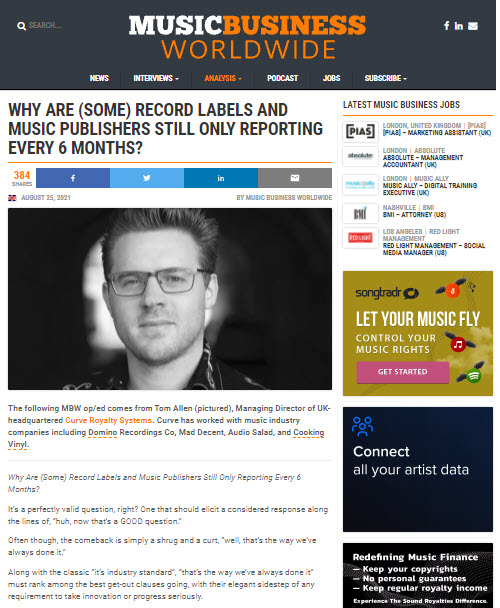Music royalties software
Individuals are obliged to chew over the notions encompassing Music Royalty Accounting Software when studying this particular theme.
Depending on where you come from, there may or may not be collective management organizations. If there aren’t you may find them under other names. When a manager has a deal on the net, they will sometimes ask for limits on the expenses. For example, artists who decide to go on the road and charter jets, throw parties in every city, put inflatable pools in their hotel suites, etc., can easily eat up the net while having a great time with their pals. Managers don’t usually enjoy these parties quite as much. The music industry executive's strength is enhanced only when the company the applicant joins has an established and tested management training program. The big boys – including major concert venues, TV networks and radio stations – are expected to supply PRS with a breakdown of the material they've used, and the society then calculates royalties due on a pay-per-play basis. That's not going to be possible with every provincial pub and pet shop, though, due to the sheer administration involved, so PRS uses a less precise ‘sample' approach to gauge what's been played. Why would music supervisors want indie music? Because you can act much faster than larger companies and will take less money than major labels will for their music. Getting a song from a major publisher at the last minute can be futile, with miles of red tape to get permission. And, they drag out negotiations to get as much money as possible. How are you planning to approach events and meeting people you should know in the music business?

Artists’ royalties on soundtrack albums generally hover in the range of 12% to 14%, all-in (i.e., including the producer), and if you’re a new artist, it’s sometimes lower. Animated films like to pay even less (pretty much for everything, by the way, since the star is often a singing weasel). Analog public performance royalties come from the Public Performance copyright, where the songwriter is owed money for each public performance of their songs. Your music marketing plan must reflect a combo of working your artist’s strengths and your budget. What is your artist prepared to do? What can you afford? What are the most realistic areas in which to invest? Budget your energy, too. Plan what you can realistically do yourself. PR? Radio promotion? Street marketing campaigns? Budget your energy so you have enough for what’s essential. A mistake many acts make in the music business is thinking they can put their show together on stage. What happens is they get what they feel is an unimportant gig at a small club or a school. The night of the gig, everyone just stumbles in thinking it isn’t a big deal, so no one prepares. Unfortunately, that could be the night someone who can help your career shows up. Market leading Music Publisher Software allows for full traceability of your world-wide music sales.
Revenues From App Advertisements
Performance rights are the rights to perform a song in public. Performance royalties or performance license monies are paid when a When you deal with something intangible like a copyright (which you can’t see, feel, or smell), it’s a challenge to nail it down. Copyrights are a tremendous amount of fun - they’re squiggly little critters that, every time you think you have a handle on them, take an unexpected turn and nip you in the butt. Musicians intuitively and quickly learn from empirical knowledge. Observation, feedback, and problem solving all lead to disciplined ways of learning new material. This is why people always say it is easiest to learn a new language when you are young. Music has, it seems, been freed from the grubby realm of things. Like everything we do on the Internet, streaming and downloading music requires a steady surge of energy. Organisations that use music need to have a license. This could be a venue that pays a PRS license or it could be a streaming service that has negotiated deals with labels and publishers. Something as simple as Royalties Management Software can clarify any issues around artist’s royalties.
Copyright ownership is pretty easy to figure out if you sit down with your accordion and knock out a little ditty by yourself. You, of course, are the owner, since you created it. But lawyers wouldn’t have much to do if it were all that simple. What kind of music you first listen to is usually based on your environment. If the guy who lives in the apartment to the left of yours plays his Charlie Parker and Ella Fitzgerald records all the time, you might well develop an affinity for jazz. If the girl who lives in the apartment on the right plays Muddy Waters and Leadbelly, you’ll probably dig the blues. It would be lovely if only the music were important, but marketing music is a business. Sales potential outweighs the importance of artistic ability. Sending a well-produced, beautifully performed album to a distributor won’t get you distribution if you have no fan base, media coverage, radio play, or promotion behind it. For years, it's been a general rule that artists make their money from touring and live performances. The artist that doesn't tour is the poor artist. A synchronization license is a license to use music in timed synchronization with visual images. A classic example is a song in a motion picture, where the song is synchronized with the action on the screen. It also includes television programs, television and Internet commercials, audiovisual streaming, home video devices, etc. Music royalties are easy to track using Royalty Accounting Software that really know their stuff.
Post a comment